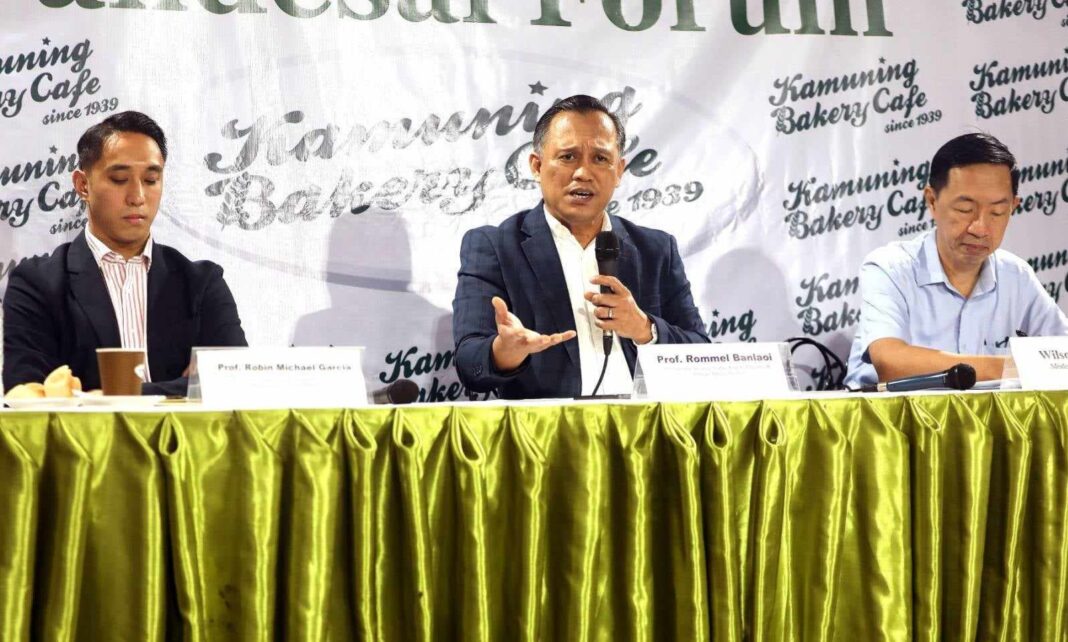
QUEZON CITY — Two of the foremost experts in geopolitics and international relations on Thursday shared the view that the Philippines would not allow the United States to use the facilities of the EDCA (Enhanced Defense Cooperation Agreement) to stage a counter-attack against China if the latter attacks Taiwan.
The EDCA is an agreement between the United States and the Philippines geared towards bolstering the American-Philippine alliance.
During the Pandesal Forum at the 84-year-old Kamuning Bakery in Quezon City and hosted by Wilson Lee Flores, Prof. Rommel Banlaoi said “I think PBBM’s (President Ferdinand “Bongbong” R. Marcos, Jr.) decision to expand EDCA with the United States is not only because of the issue of the South China Sea but also because of other pressing matters.”
Banlaoi is a political scientist, counter-terrorist scholar, international security studies expert, educator and foreign affairs analyst. He was also a former deputy national security adviser with the rank of undersecretary and president of the Philippine Society for Intelligence and Security Studies.
“Honestly, both the United States and China would not want to go into a ‘direct collision’ in the region (South China Sea). As much as possible, they would want the ‘status quo’ to remain. They are not prepared to enter into any kind of ‘armed conflict’ in the region,” Banlaoi stressed.
The security expert noted that there are two situations wherein China may be compelled to take action such as if Taiwan declares independence, China would take military action to prevent it. The other one is that if China uses military force to unify Taiwan with the mainland of China.
However, Banlaoi said, the United States is urging Taiwan to declare its independence from China.
When asked by the Mabuhay if the one-billion strong People’s Liberation Army of China would attack Taiwan, do you think the United States would use the EDCA facilities in the Philippines to stage a counter-attack against China?
Both Banlaoi and Prof. Robin Michael Garcia replied in the negative.
Garcia is a professor, political scientist, adviser, Eisenhower Fellow 2023, consultant of the Congressional Research Fellow at the House of Representatives and teaching at the University of Asia and the Pacific. He studied at the University of the Philippines. He is also an international relations expert and geopolitics analyst.
“A war between the United States and China would be catastrophic. It’s especially most catastrophic to the Philippines,” Garcia said.
“The total trade value between the United States and China represent 40 percent of the world economy,” he added.
“I think we have to ask for more benefits from the United States. I’m still waiting for more granular, more rigorous documents not outlines in the management of EDCA,” Garcia stressed.
He merely termed as “just a general statement” the US$ 100-million pledged by the United States for the construction activities related to EDCA.
Banlaoi also noted that the Philippines already said “no” to the United States twice. Number one is no to 99 years for military bases in the Philippines, and only for 25 years, and the Military Bases Agreement between the Philippines and the United States expired in 1991.
The other one, he said, “no we don’t want you to stay longer in the Philippines. The 1986 People Power Revolution happened, academically saying, it’s when we said no to the US. US almost abandoned us. The reason why we established relations with Australia and other countries.”
The United States had the Clark Airforce Base in Angeles City, Pampanga and the Subic Naval Base in Olongapo City, Zambales, which were both abandoned after the destructive eruption of Pinatubo Volcano on July 16, 1991. – By Perfecto T. Raymundo, Jr.


